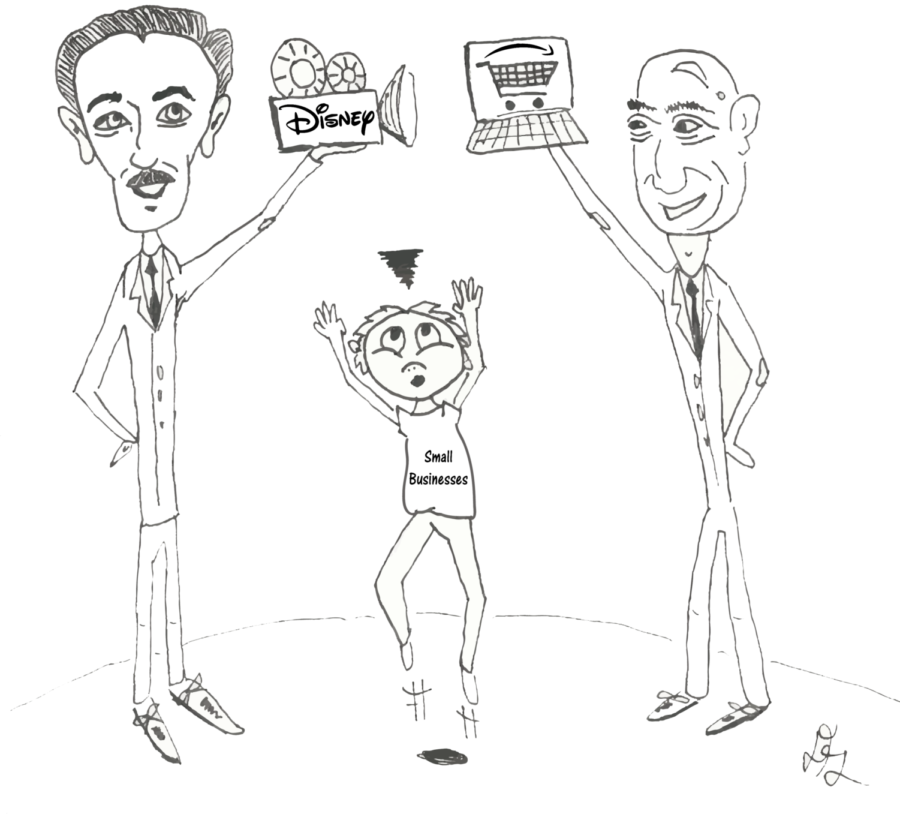New Age Monopolies Will Cause Irreversible Effects
With the advent of the internet, digital media and streaming, companies have found new markets to monopolize and exploit. Large mass media companies such as Disney and Amazon are creating monopolies that are likely to cause problems to our future economy.
As defined by Google, a monopoly is “the exclusive possession or control of the supply of or trade in a commodity or service.” Although this may not seem like it could cause harm, there are problems that lie deeper beneath the surface of the issue. CBS News states that monopolies “have such power, they charge prices that are higher than can be justified based upon the costs of production.”
Certain laws have been passed in Congress to prevent monopolies, though many are not effective. In 1890 the Sherman Act was passed, outlawing “every contract, combination, or conspiracy in restraint of trade,” as well as any “monopolization, attempted monopolization, or conspiracy or combination to monopolize.” The wording in certain laws is vague and does not make it illegal for companies to takeover a large percentage of an industry, only entirely take it over.
Let’s start with Disney. Statistical analysis from The Verge show that with Disney’s acquisition of Fox Broadcasting Company, it owns about 40 percent of the entire film industry. Additionally, Disney has been in the process of making new movies based off popular movie series such as Star Wars and Marvel to add themed additions to the Disney parks. Disney will remove all of its content from streaming companies on Nov. 12 in order to make it exclusively available on its soon-to-be-released streaming service, Disney Plus.
Although Disney’s expansion may not seem problematic in the present, it could create future problems in our economy. Since Disney owns such a high percentage of the film industry, it is eliminating competition and the opportunity for new start-ups to grow, according to CBS News.
Instead of distributing wealth across many companies, Disney is controlling the wealth within the company and using their spending power to out-compete smaller companies like Six Flags. As any monopoly would, this allows them to increase the price of entrance to the park by eight percent each year according to CNN due to the difficulty for other companies to compete with their prices while still profiting themselves.
Another major corporation that has caused a stir in the global economy is Amazon. CNN states that Amazon “has tended to lower prices for consumers, but it is also now by far the largest portal for online shopping, which gives it enormous power over the producers that sell on its platform.”
The introduction of Amazon Prime, free shipping and the ability to sell products cheaper than retailers have forced many stores like Sports Authority and Payless ShoeSource to go out of business. The increased convenience created by Amazon allows Prime subscribers to have something shipped to their house for free rather than driving to get something at a higher price. By crushing the competition, Amazon has taken away jobs from about 140,000 retail employees, according to CNBC.
This issue is relevant not only today as students when we, for example, want to go to Disneyland, though cannot afford the $500 – $900 annual pass, which will likely increase in the future as it has been doing in the past. It is also relevant in the future. Imagine that you are trying, but cannot compete with the bigger companies because of lack of funding or high competition. You would be pretty upset, right? Well this is why we need to fight the monopolies in the digital age.
To solve our existing problem of monopolies, the government should use funding from tax money to foster the development of start-ups. As proved by Franklin D. Roosevelt’s New Deal program, the only way to foster new business is to have government programs provide relief such as tax cuts and loans to starting companies to allow them to compete with larger companies.
Some may say that our current monopoly laws are sufficient and there is nothing to worry about because the economy will equal itself out without government intervention, but this was the same exact policy that plunged our country into our two largest depressions of all time in 1929 with President Hoover’s idea that it was just a cycle of the economy and in 2007 when Bush cut government spending.
There might not be much that students can do to prevent monopolies from expanding, but there are small choices you can make. For example, you might support a new clothing store instead of purchasing something on Amazon. The difference might seem negligible, but every little bit helps to fight the monopolies being expanded every day.
Your donation will support the student journalists of Portola High School. Your contribution will allow us to purchase equipment and cover our annual website hosting costs.

Dylan Gates is the Media Director of the 2018-2019 Portola Pilot staff. He is in his Junior year at Portola and has been working with the Pilot since the...




